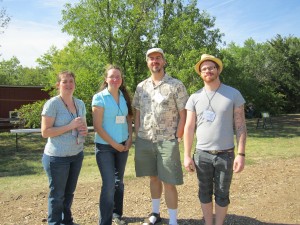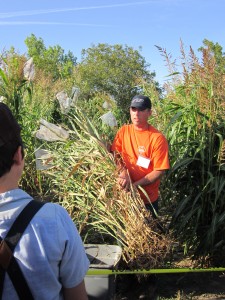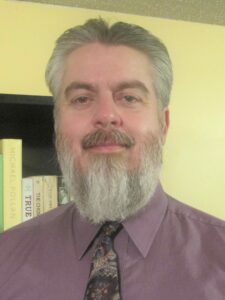[Cross-posted to In Medias Res]
Wichita, KS
A couple of weeks ago some fine intellectuals, political figures, journalists, and activists associated with this blog gathered together to talk about localism, and specifically how one might discover in our local communities resources for pursuing the common good in an age of globalization. I wish I could have been there. But at the same time they were meeting in Emmitsburg, MD, I was spending time with some students in Salina, KS, listening to Naomi Klein and a couple of earnest agronomists and botanists, and in a sense they were all talking about the exact same thing as was being discussed at the Front Porch Republic conference: how a particular sort of local work and community investment is inseparable from any serious pursuit of that which is the common good of us all. So perhaps, ultimately, I didn’t miss anything at all. In any case, it was a delightful day.
 This is the second year that I’ve made it out to the Land Institute‘s annual Prairie Festival, and like last year, which featured a presentation by Wendell Berry, I came away last Saturday with a dozen different ideas about how I could push my students to think a little more critically about how the food they eat, the cars they drive, and the lives they live all impact the natural environment upon which we depend, and either add to its potential sustainability or contribute to its destruction. That may seem like a somewhat stark distinction, but it was central to Klein’s presentation, and my students in “Simplicity and Sustainability”–a course I’ve invented and am teaching for the first time–needed to hear that starkness, so as to perhaps shake them out of their complacency, and maybe even help them recognize that the simplicity I’ve been trying to point them towards is being undermined by the ever more abstract and complex (and self-justifying) systems we allow to be constructed around us, or help to build ourselves.
This is the second year that I’ve made it out to the Land Institute‘s annual Prairie Festival, and like last year, which featured a presentation by Wendell Berry, I came away last Saturday with a dozen different ideas about how I could push my students to think a little more critically about how the food they eat, the cars they drive, and the lives they live all impact the natural environment upon which we depend, and either add to its potential sustainability or contribute to its destruction. That may seem like a somewhat stark distinction, but it was central to Klein’s presentation, and my students in “Simplicity and Sustainability”–a course I’ve invented and am teaching for the first time–needed to hear that starkness, so as to perhaps shake them out of their complacency, and maybe even help them recognize that the simplicity I’ve been trying to point them towards is being undermined by the ever more abstract and complex (and self-justifying) systems we allow to be constructed around us, or help to build ourselves.
Klein’s presentation was, in many ways, a tribute to starkness of vision: particularly that vision which characterizes global warming deniers of all varieties, whether they be the corporate powers that be or conservative foot-soldiers in the Tea Party. Klein praising the Tea Party? Yes, that’s what she did, repeatedly, in her hour-long presentation. Because, as she insisted again and again, “they get it.” They get that the stakes in this battle–a battle between, to speak broadly, essentially unrestrained technological growth on the one hand, and a fear for the trampling of essential limits, disciplines, and attachments which a fundamentally self-interested gospel of expansion teaches us to ignore on the other–are nothing less then our basic economic system itself. In their paranoid accusations against President Obama–that he is not “really” an America, or that he is some sort of radical post-colonial socialist at heart–reveal their confused but fundamentally sound grasp of the central matter: if the arguments which make the case for global warming are accepted, then our whole way of life–primarily, its reliance upon non-renewable energy sources like oil for easy mobility, cheap goods, anxious consumption, irresponsible levels of waste, and a casual and inattentive relationship with the planet we live upon and the food from it which we eat–must change. Capitalism must change. And that, Klein argued, I think rightly, is a stark challenge that most self-identified liberals (though maybe “neoliberals” would be a better description) and environmentalists just don’t appreciate.
Klein discussed the months she has spent researching her current project, a project that took shape most particularly through the BP Oil disaster in the Gulf of Mexico, where she said that, in looking at videos of that “hemorrhaging wound” in the ocean floor, she was struck more viscerally than she’d ever been before by how much collateral damage our highly technical, highly complex, global capitalist system is willing to allow to be built into into one or another corporation’s profit/loss statements. She said that she felt that the overwhelming message of that disaster is how pointless, and counter-productive, the technical efforts of many who simply want to modify our current extractive practices really are. Well-intentioned liberals and scientific experts, studying just how much of a temperature increase existing staple food crops can handle, geo-engineers thinking about ways to seed the atmosphere with certain compounds that could more effective absorb existing thermal outputs, talk about “solar radiation management”: it’s insane, Klein felt (and the crowd–a bunch of people who all believe in exploring what can be done with the planet, not to it–loudly agreed). Such a mentality–the mentality of “green technologies,” and the promise of a transformation of our current consumptive patterns into ways of building and spending which can absorb all the changes we have unintentionally introduced to the planet around us–may have honorable intentions, but in the end it just leaves us all no different from those who drill the dirty deep-sea oil wells: it leaves us as mere consumers, finding entertainment and validation in our supposed individual ability to “slap mother nature in the face.”
Such a mentality–the mentality of “green technologies,” and the promise of a transformation of our current consumptive patterns into ways of building and spending which can absorb all the changes we have unintentionally introduced to the planet around us–may have honorable intentions, but in the end it just leaves us all no different from those who drill the dirty deep-sea oil wells: it leaves us as mere consumers, finding entertainment and validation in our supposed individual ability to “slap mother nature in the face.”
And so, Klein called for starkness–for recognizing that global warming is not something that can be fixed or moderated or addressed by us; it is, rather, something that, if we want to survive as a civilization and a species, demands something of us. She said her tentative title for her next book is “What Climate Change is Telling Us About How We Must Evolve”….and she credits the global warming deniers for at least recognizing that demand for what it implies. In the same way powerful corporate interests attack unions, push for deregulation, insist on the legitimacy of their habits of consumption, praise globalization, denounce all forms of protectionism, and defend their wealth from the demands of the commons, they also fight the science of global warming tooth and nail–because to give it credence would be to invite a fundamental economic transformation, one that would undercut their position of privilege entirely.
What would that transformation entail? Not, Klein believes (and again, I tend to agree with her) a “green Keynesianism”–that kind of state-heavy redistribution, or even industry nationalization, may have its place in some areas of our social lives–and may even be have to be relied upon as the only tool powerful enough to turn the profits of the world’s largest energy corporations towards paying for the transition to come–but by and large that vision of the world would depend (as E.F. Schumacher presciently noted long ago) on the same sort of acquisitive, growth-centric capitalist mentality which created the conditions of the problem in the first place. And the needed transformation must certainly not, Klein insisted multiple times, take us in the direction of state socialism, which is the only economic system worse for the planet than a corporate-friendly free market (she noted with some humor that, looking at long-term environmental trends, the single best news which the planet’s supplies of breathable oxygen and drinkable water had received in the past thirty years was the collapse of the Soviet Union). No, what we need out of the necessary economic transformation which faces us is a recovery of the lost art of “decentralized planning”: of turning our knowledge of the planet towards diverse ways of tending to it, locally and sustainably. (If you think that sounds like a kind of anarchism or mutualism, you’re probably not wrong; Klein is enough of a radical democrat to be hanging out in New York City with the Occupy Wall Street crowd, arguing that there is something to be said for putting yourself bodily into a struggle, given that voting doesn’t always seem to be enough to make changes these days.) Which is what bring us around to the vital–and very practical, hands-on, and bodily–work being done at the Land Institute itself.
 After listening to Klein, and speaking with some “sustainable community” organizers and urban farmers visiting from St. Louis, we took a tour with a couple of enthusiastic graduate students, who showed off to us all, and talked about the prospects for further developing, their experiments with sustainable agriculture. Their goal is to use such native perennials–often more commonly known as “weeds”–as Illinois bundleflower, switchgrass, Kansas sunflowers and others, as resource for creating hybrid food crops (grains and legumes, mostly, with particular attention paid to wheat and sorghum) that will require minimal irrigation, need few or no pesticides or herbicides, have deep root systems (thus cutting down on the soil erosion experienced during every harvesting season), and–most importantly–produce sufficiently high yields to be able to feed local populations without a heavy reliance upon the networks of contemporary agribusinesses. This is not, to be plain, easy or easily rewarded work. In attempting to work with only those resources that the Plains states provide (most of the work of The Land Institute is, of course, done in Kansas, but they have research programs working at locations in Minnesota and elsewhere as well), they are looking to turn agriculture away from the oil-based industrial basis that has been assumed as the only route to making it sufficient for current population levels and ranges for more than sixty years, if not longer. This doesn’t just mean developing more perennial options; it also means changing our expectations for food productivity and food consumption itself. (For example, one of the problems with Illinois bundleflower is that, though potentially a wonderful food staple, with a high nutritional content, a minimal environmental footprint, and excellent climate resistance, it tastes so terrible that most birds won’t even eat it.)
After listening to Klein, and speaking with some “sustainable community” organizers and urban farmers visiting from St. Louis, we took a tour with a couple of enthusiastic graduate students, who showed off to us all, and talked about the prospects for further developing, their experiments with sustainable agriculture. Their goal is to use such native perennials–often more commonly known as “weeds”–as Illinois bundleflower, switchgrass, Kansas sunflowers and others, as resource for creating hybrid food crops (grains and legumes, mostly, with particular attention paid to wheat and sorghum) that will require minimal irrigation, need few or no pesticides or herbicides, have deep root systems (thus cutting down on the soil erosion experienced during every harvesting season), and–most importantly–produce sufficiently high yields to be able to feed local populations without a heavy reliance upon the networks of contemporary agribusinesses. This is not, to be plain, easy or easily rewarded work. In attempting to work with only those resources that the Plains states provide (most of the work of The Land Institute is, of course, done in Kansas, but they have research programs working at locations in Minnesota and elsewhere as well), they are looking to turn agriculture away from the oil-based industrial basis that has been assumed as the only route to making it sufficient for current population levels and ranges for more than sixty years, if not longer. This doesn’t just mean developing more perennial options; it also means changing our expectations for food productivity and food consumption itself. (For example, one of the problems with Illinois bundleflower is that, though potentially a wonderful food staple, with a high nutritional content, a minimal environmental footprint, and excellent climate resistance, it tastes so terrible that most birds won’t even eat it.)
There have been successes, like the development of an edible perennial hybrid wheatgrass called Kernza. But those successes don’t come quickly or easily, and no one should expect them to: Wes Jackson, the founder of the Land Institute, has called the quest for sustainable agriculture a “10,000 year problem”. There is a reason why human communities the world over have, for centuries, been drawn to the appeal of cheap energy and rapid growth, even if such does involve them in increasing complex and corrupt economic and political systems which distance them from any real stewardship over the very goods and goals they were trying to achieve and produce in the first place. But in this little corner of north-central Kansas, there are people both talking the talk and walking the walk that a revival of sustainable, local, environmentally wise and democratically achievable stewardship. I wish I could have seen all there was going on at the Land Institute that weekend (see here for an additional write-up); I wish I could take my students up there every other week. I do think a liberal arts education in the principles and practices of politics, philosophy, religion, science, history, economics, and more is a good thing…but then again, this is Kansas, and learning a little bit more about how, seed by seed or provocation by provocation, we can wean ourselves away, or teach others how to get away, from a capitalism which is imperiling the globe and exchange it for the humbler work getting most of what human beings need from the resources they have on hand…well, that may be a better and more appropriate thing altogether.





10 comments
wufnik
Just caught up with this post–nice job. I admire both The Land Institute and Klein, and I bet they’ll make a good pair going forward. I could see how she and Wes Jackson would hit it off. Jackson, after all, was the guy who said “The universities now offer only one serious major: upward mobility.”
And, on another note, it’s instructive this these sorts of debates still get hijacked by the global warming issue, isn’t it? The meme that it’s not happening is still pervasive. I’m sort of hoping the entire AGW crowd will move to Arizona for the next decade.
“Just enough of me, way too much of you.”
Hardly limited to the progressive left. Could apply to white local politicans in Alabama too, for example.
Nelz
Naomi “Shock Doctrine” Klein, who writes for The Nation — seriously?
SAW
I’ve got to say that Klein is telling the truth but telling it slant. There’s no way we’ll disassemble our entire fossil fuel based economy. But that’s beside the point that humans didn’t cause global warming or climate change. My proof? The Chesapeake Bay, which formed when sea levels rose after the water locked up in the glaciers of the last ice age began melting about 20,000 years ago. The Bay is a geographic formation called a ria, a drowned river valley open to the sea, originally the Susquehanna River Valley. The edges of the subsea continental shelves off the East Coast of North America used to be the Atlantic beaches. Since we’ve only been burning the fossil fuels for about 150 years, this climate change could not have been caused by humans if the cause is, in fact, humans spewing carbon into the environment. CERN recently did studies which connect cosmic radiation to cloud formation and climate change. (Google that.)
So Klein is close to right on in that if you buy the anthropogenic global warming argument, we’ll have to stop doing what we’re doing, which is impossible. The climate change discussion needs to be split into its critical components: 1) climate change and global warming are real (because we’re in an interglacial warming period), and 2) Humans have not caused and are not causing the change, much as we’d like to think we are.
We will have to adapt to the change. Earth history is full of climate change and humans weren’t ever there to cause it.
In fact, anthropogenic global warming may be the biggest intellectual mistake in the history of human thought since the pre-Galileo geocentric view of the solar system, so beloved the popes and learned powerful for about 1,500 years. We’re not that much different from them, are we.
Martin Snigg
Mark I know this is not the forum to hold a global warming debate, but a few words.
‘Global warming denier’ is unashamed propaganda it’s strange you try to deny this. It makes hay out of the universal abhorrence and irrationality of a ‘holocaust denier’. If the science truly is ‘settled’ only then might it be necessary and good. But this isn’t the case.
The falsehood behind deployment of the phrase is that dissent from hypotheses of dangerous AGW is denial of a measured warming trend. Criticism of AGW alarm amounts to criticism of the interpretation of the data, criticism of CO2’s affect as a variable in computer modelling that can only approximate exceedingly complex and little understood climate systems .
To illustrate the vacuity of ‘global warming denier’ consider its use against those who ‘deny’ global warming during the mediaeval period around which so much scientific contention, and controversy (Climate Gate) remains. The data used to produce the principle piece of evidence for the ‘Alarming AGW’ hypotheses which the IPCC accepted
http://wattsupwiththat.com/2011/06/02/manns-hockey-stick-climategate-and-foi-in-a-nutshell/
[MBH98 is the infamous Mann ‘Hockey Stick’ graph] remains a matter of controversy and has reached the courts. This and dubious IPCC procedures, were the warrant for billions in general revenue disgorged by governments, entrenching in public life a ‘new order of things’. [The link above comes from the most popular science blog and most visited climate site in the world.]
The AGW movement has questions to answer with respect to its affects on the developing world that we know with more certainty than those predicted by climate modelling. We know higher concentrations of CO2 potently increase food crop yields with certainty, warmer temperatures globally in general make the planet more commodious for humans; AGW politics hurt the poor disproportionately when food prices are affected as crops are diverted to biofuel production; funding of speculative and expensive green energy schemes cost worthwhile investments in the developing world; and regulatory uncertainty impedes investments by coal companies.
Added to my original thoughts I think the prima facie case against runaway global warming alarm is very strong. Scrutiny of its claims is carried out overwhelmingly by volunteers and brave scientists who risk their careers speaking out.
At the very least all this ought to give us pause before we repeat the most derogatory propaganda attached to AGW alarm, and in this political climate using it only helps to obscure the pernicious elements of the AGW movement.
Mark Conder
To M.
Naomi Klein definition of ‘global warming deniers’ as “characterizes global warming deniers of all varieties, whether they be the corporate powers that be or conservative foot-soldiers in the Tea Party” was spot on.
Contrary to your “hyper-liberal” characterization it is not political in it’s base form. It is used for a person or entity which explicitly denies that “the planet” continues to warm in the face of the incontrovertible evidence otherwise. Obviously your experience has been compromised by certain industrial-politcal factions that promulgate the falsehoods of non-auditing, professors profiteering via energy taxes, etc. Unfortunately for the actual vast millions struggling in poverty, global warming is yet another destructive legacy thrust upon them from a political class that compromised with the multinationals – maintain the cycle of grinding poverty through the destruction of their natural resources (among other things). It might be enlightening to examine just what material progress in the 3rd world actually entails and which power structures are threatened by it.
M.
“At it’s core, distributism is about structuring society so that capitalism has enough capitalists to function properly. ”
Wonderful essay. One quibble.
‘Global warming deniers’ was an unfortunate choice. It’s an epithet used by hyper-liberals where I’m from to shut down the coal exports developing countries are using to lift 100’s of millions out of grinding poverty.
They’ve used the many billions in climate change spending to sponsor one side of the debate, none to auditing the ‘science is settled’ catastrophic conclusions. To me this fits perfectly the historical pattern: science as an institution is just the latest to be assimilated by the state. It fits the pattern of a self justifying politcal class who faciley project the role of planetary saviors and who, not co-incidentally, are the same ones most able to moderate the higher prices their proposedd energy taxes will mean. And the same ones who feel threatened by the material progress of developing countries where the Christian revolution continues full steam. [Philip Jenkins].
Fealty to nasty oil producing regimes, economic servitide of consumerism, infertility, atomization and the perpetuation of deracinating liberalism are more than enough reason to imbibe everything that FPR produces.
B.E. Ward
Oh no, no. It wasn’t a snark on you, Russell. It’s a line he uses to critique the progressive left’s attitude towards the human race’s place in the world.
D.W. Sabin
Dang Skippy, them white socks in them sandals may be organic cotton but it just aint sustainable.
A “ten thousand year problem” . Hmmm, this handily coincides with the conventional wisdom of man’s forays into this continent. We must be slow learners. Actually, I think we are too quick in the un-learning dept.
Russell Arben Fox
I’ve never read anything by Klein on overpopulation, abortion, contraception, or really any of the usual culture war issues. Given how prolific she is as a writer, she probably has written on such topics though, and if so her views on such would probably be fairly typical of the progressive, feminist audience that has made up the bulk her readership as she has attacked the power of corporations to pollute the planet and our minds with logos and brands over the years. But as far as I feel confident making guesses, it didn’t seem like an audience of progressive feminists responding strongly to her linking of the threat of global warming to the healing work of local farming; they seemed mostly like middle-aged to older folks who were mainly there to support the ideas of localism and stewardship of the land. Hard to read minds, though. (Or maybe you’re using Shea’s phrase to snark on me? If so, I accept the snark; I do tend to be too verbose for my own good.)
B.E. Ward
I wonder what Klein thinks of ‘overpopulation’. I’m pretty sure I have a good idea what she thinks (along with the tangential issues of abortion and contraception), but I’d hate to put words in her mouth. However, what’s written here of her presentation reminds me of Mark Shea’s oft-used phrase: “Just enough of me, way too much of you.”
Comments are closed.